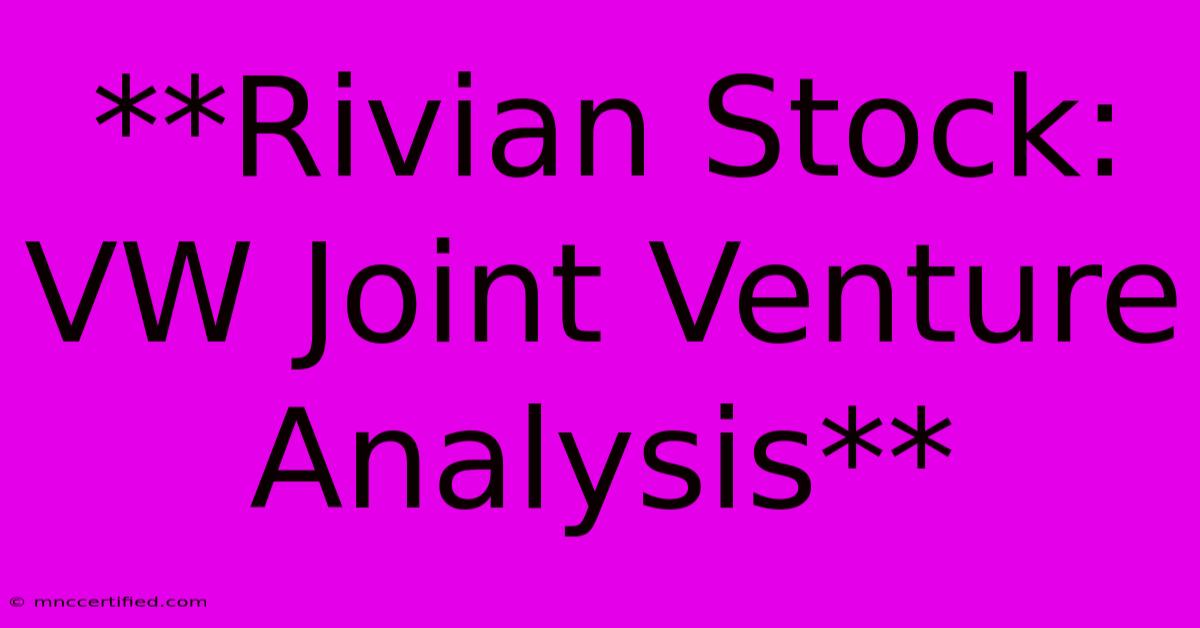**Rivian Stock: VW Joint Venture Analysis**

Table of Contents
Rivian Stock: VW Joint Venture Analysis - A Deeper Dive
Rivian Automotive (RIVN) is a leading player in the electric vehicle (EV) market, and its partnership with Volkswagen (VW) has generated significant interest among investors. This article delves into the Rivian-VW joint venture, analyzing its implications for both companies and the broader EV landscape.
The Rivian-VW Joint Venture: A Strategic Alliance
In 2021, Rivian and VW announced a strategic partnership that involved several key aspects:
- VW Investment: VW invested $2 billion in Rivian, acquiring a 12% stake in the company.
- Technical Collaboration: The two companies agreed to collaborate on developing electric commercial vehicles (CVs), with Rivian leveraging its expertise in EV technology while VW provides its global scale and manufacturing prowess.
- Shared Platform: Rivian's "skateboard" platform, which houses key EV components like the battery pack and powertrain, was licensed to VW for use in its own CV models.
Benefits for Rivian
The VW partnership brought several advantages for Rivian:
- Financial Resources: The $2 billion investment provided Rivian with crucial funding to accelerate its production and expansion plans.
- Access to Global Markets: VW's global network of manufacturing facilities and distribution channels opened up new markets for Rivian, expanding its reach beyond the United States.
- Scale and Expertise: Collaboration with VW allowed Rivian to leverage VW's experience in large-scale production and global logistics, contributing to cost efficiency and operational optimization.
Benefits for Volkswagen
For VW, the Rivian alliance offered several strategic benefits:
- EV Expertise: Rivian's advanced EV technology and know-how provided VW with a competitive advantage in the rapidly evolving EV market.
- Entry into New Segments: The partnership allowed VW to enter the rapidly growing market for electric CVs, leveraging Rivian's expertise in this segment.
- Sustainability Goals: The collaboration aligned with VW's sustainability objectives, accelerating its transition to a fully electric fleet.
Impact on Rivian Stock
The Rivian-VW joint venture has had a mixed impact on Rivian stock:
- Initial Boost: The announcement of the partnership initially boosted Rivian's stock price, as investors saw it as a validation of the company's technology and potential.
- Short-Term Volatility: In the months following the announcement, Rivian's stock price experienced volatility, reflecting factors like broader market conditions and the company's own performance.
- Long-Term Implications: The long-term impact of the partnership on Rivian stock remains to be seen. The success of the collaboration and the market's perception of Rivian's future will be key factors in determining the company's valuation.
Future Outlook
The Rivian-VW partnership has the potential to be a mutually beneficial alliance, propelling both companies forward in the EV market. However, several factors will influence the success of this collaboration:
- Execution of Plans: The successful implementation of joint development and manufacturing projects will be crucial to realizing the partnership's full potential.
- Market Competition: The EV market is becoming increasingly competitive, and both Rivian and VW will need to navigate this dynamic landscape effectively.
- Customer Adoption: The ultimate success of the partnership will depend on consumer adoption of the resulting electric vehicles.
Conclusion
The Rivian-VW joint venture is a significant development in the EV landscape, bringing together two industry giants with complementary strengths. The partnership has the potential to unlock significant value for both companies, but its ultimate success will depend on various factors including execution, market conditions, and consumer demand. Investors will continue to closely monitor the progress of this alliance as it plays out in the years to come.
Keywords: Rivian stock, VW, joint venture, electric vehicles, EV, commercial vehicles, CV, partnership, investment, collaboration, skateboard platform, sustainability, market competition, customer adoption.

Thank you for visiting our website wich cover about **Rivian Stock: VW Joint Venture Analysis**. We hope the information provided has been useful to you. Feel free to contact us if you have any questions or need further assistance. See you next time and dont miss to bookmark.
Featured Posts
-
Nea Members Insurance Trust Reviews
Nov 14, 2024
-
Trump Announcement Boosts Dogecoin Price
Nov 14, 2024
-
John Krasinski Shares Emily Blunts Funny Reaction
Nov 14, 2024
-
Trump Group Announcement Boosts Dogecoin Price
Nov 14, 2024
-
Katie Nestlerode Fisher Investments
Nov 14, 2024